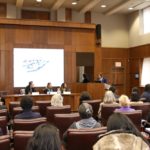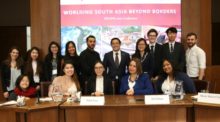Katherine MacIvor
As the INDePth Conference opened at the Munk School of Global Affairs on Friday, March 10, 2017, the Statement of Acknowledgement of Traditional Land was read out to the audience as a reminder of the Indigenous heritage of the land on which U of T operates. In his opening remarks, conference co-chair Atif Khan pointed to the strong link between this statement about Indigenous lands in Canada and the aim of the conference – with a theme this year of Worlding South Asia Beyond Borders – to challenge common conceptions of South Asia, critique development, and reimagine the region in its living complexity.
This year’s INDePth Conference was recognized with the University of Toronto Student Union (UTSU) Event of the Year Award. Unlike most academic conferences, this one’s goal is not to disseminate knowledge, but rather to disrupt and problematize participants’ own conceptions, inspiring them to reimagine the region of South Asia beyond borders and hierarchical labels of “third world,” “developing,” or “Eastern.” Through its unique format of student presentations, faculty responses, and interactive workshop discussions, the conference places students at the forefront.
In addition, cultural performances and the use of audio-visual components “utilized the arts as a method of knowledge that essays, theories, and academic perspectives do not always account for,” explained conference co-chairs Atif Khan and Arnold Yung.
The INDePth Conference (Interrogating Notions of Development and Progress), organized by undergraduate students at the Asian Institute, has a history of tackling difficult subjects and drawing attention to voices and perspectives that are often overlooked. Started five years ago by students in the Contemporary Asian Studies Student Union (CASSU), the annual conference brings together scholars and students from across disciplines to better understand social and economic development in Asia through a critical development studies lens.
The keynote by Professor Chandrima Chakraborty of McMaster University set the tone for the conference through an analysis of the Air India bombing of 1985. Though the plane had departed from Canadian soil and the majority of the victims were Canadian citizens and Permanent Residents, the event was dismissed by Canada at the time as a “foreign” tragedy.
South Asian Studies student Kate Fedorova described in her presentation how despite common notions of South Asian cities as overcrowded, polluted, and poverty stricken, in many ways these cities are in fact more developed than the West – they are sites of incredible technological innovation. Yet, development and opportunities are not distributed evenly, and there has been great dispossession and dislocation of the urban poor. Professor Francis Cody’s response highlighted considerations that are often ignored in discourses of world class, cosmopolitan cities: slum clearances as a result of rising land values, the collapse of small-scale agriculture as a viable way of living, the subaltern worlding of immigrants (such as Sri Lankans and Africans in New Delhi), and the informal modes through which development sometimes takes place (where slums can be sites of incredible opportunity, as seen, for example, through the garbage trade in New Delhi).
“Conferences should strive to contribute to conversations in new and unexpected ways,” explained Atif and Arnold. “The topic should bring something new to the table. The approach should challenge our perceived notions of knowing something. So many resources go into making a conference a reality, so it’s important that they result in contributing to the greater community and creating an accessible space of engaging ideas.” They noted that the ideas and themes introduced in their Contemporary Asian Studies courses were instrumental to the conference, which was the culmination of a year of planning and hard work by a committed executive team.
Photos by Nolan Terrell.
- Kate Fedorova Presents at the INDePth Conference. Professors Francis Cody, Rachel Silvey, and Antonela Arhin sit on the panel.
- INDePth Executive Team
- Students on panel at INDePth Conference.



